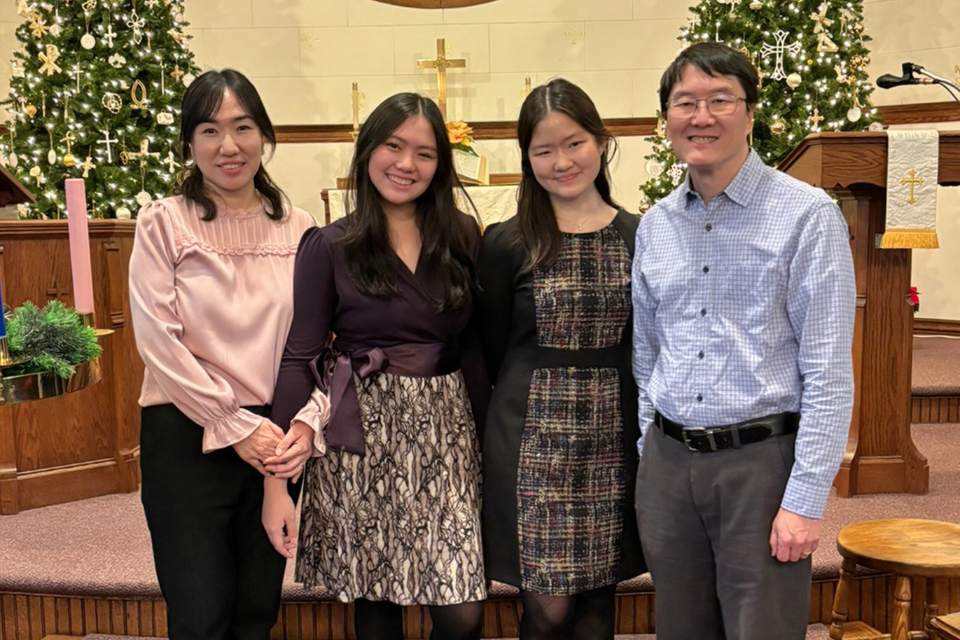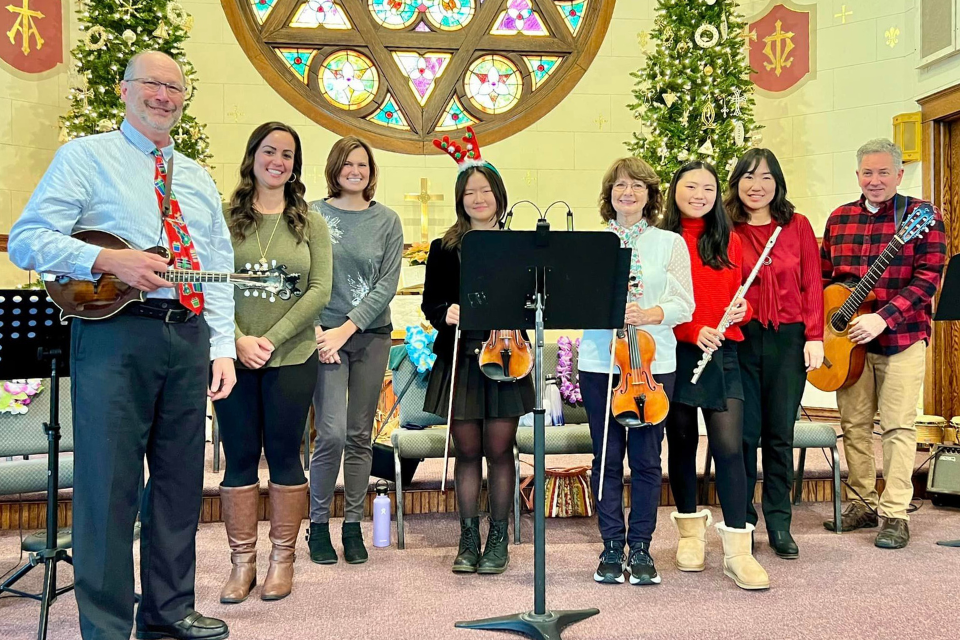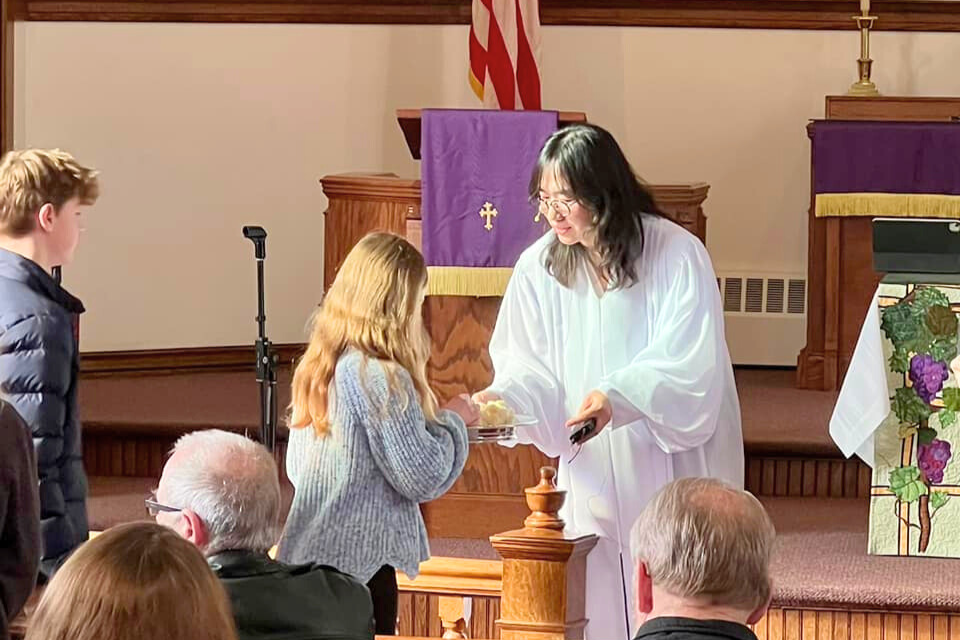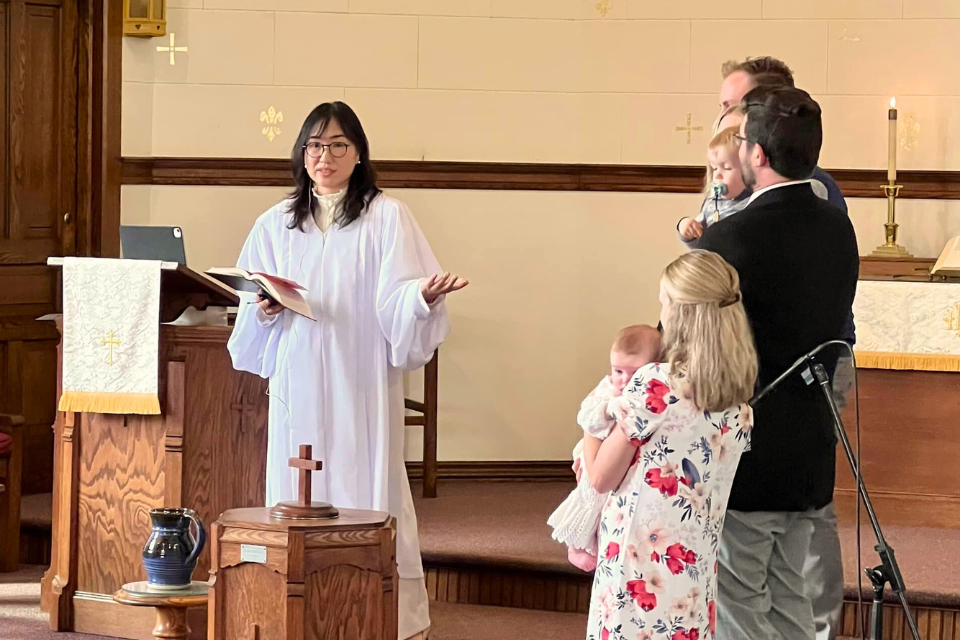In celebration of Asian American, Native Hawaiian, and Pacific Islander Heritage Month, Rev. Sunhwa Hopgood recounts her call to ministry as a Korean American woman and the joys and challenges she’s experienced serving in cross-cultural ministry.
JAMES DEATON
Content Editor
From a young age, Rev. Sunhwa Hopgood felt God’s call. She did not know she’d eventually become a pastor, but using her gifts in the church has always been part of her life.
She recalls talking to her daughter when she got her first appointment at Washington UMC, just north of Rochester, Michigan, in 2022: “I asked my daughter Julia, who was 11 years old at the time, ‘How do you feel about me being a pastor?’ She answered, ‘Mom, what’s the difference before and now? You have always served God and the church.’”
Born in Seoul, South Korea, Sunhwa was raised in a Christian family. She loved going to church and was shaped by various faith experiences as a child and teenager. After graduating from high school, she continued to serve in leadership roles, such as Sunday school teacher, praise team member, and small group leader.
The year 2001 was a pivotal time in Sunhwa’s life. Her uncle, Dominic Pangborn, who came to the United States when he was 10 years old, is half-Korean and was adopted by Americans. He asked Sunhwa and her sister to come to Michigan to study and have the opportunity to experience new things.
She took this step of faith, trusting God’s promise to watch over her wherever she went, and moved to the United States, enrolling in a master’s program studying human resource management. That led her to a job working for a construction company in Detroit.
The journey to the United States also led her to meet Hoon-Yung, her husband, who was also adopted from Korea and living in Michigan. To worship together as a newly married couple, Sunhwa joined the English-speaking ministry of Korean Methodist Church of Detroit in 2006.
In 2018, while praying and discerning about her career and studying the book of Exodus, she received assurance from God that she was being called to lead God’s people. “I see my calling in a way similar to God calling Moses,” says Sunhwa, “who was born as an Israelite but raised in Egypt. I was born in Korea, but now I serve here in the United States. God gave me a strong heart to be a bridge between people with different languages, cultures, and identities.
Sunhwa’s bicultural identity is also reflected in her name. She explains, “I always say God called me as a pastor through my new name. Sunhwa is a typical Korean name. Hopgood is the last name of the family who adopted my husband and the name I took when I got married.”

Growing up Presbyterian in South Korea, Sunhwa never saw a woman become a lead pastor. However, as a United Methodist pastor, she is grateful for the clergywomen who have fought for the right for women to be ordained. She names the story of Colleen Kyung Seen Chun, who became the first Korean American woman ordained in the California–Pacific Conference in 1983.
“Her call story is similar to many Korean women clergy, including mine,” says Sunhwa. “She received God’s call but did not know if women could be ministers. However, God opened the door for her, and The United Methodist Church supported her to be ordained.”
Sunhwa felt supported as a student at Methodist Theological School in Ohio through scholarships and encouragement from staff and colleagues, which built up her confidence as a Korean American woman entering set-apart ministry. Her seminary and many of her clergy mentors treated her equally and valued and supported her throughout the ordination process as she developed her unique gifts for pastoral ministry.
“I love who I am. I am a woman, Korean American, immigrant, wife, the second of five daughters, mother of two daughters, and daughter-in-law of a Caucasian. These aspects shape who I am as a pastor, influence how I interpret scripture passages, and guide my service to the church, community, and the world.”
Since answering her call to ministry, God has provided people, resources, and wisdom that have sustained her in ministry, especially as she has been appointed to cross-racial, cross-cultural ministry in predominately white United Methodist congregations.
“Some people thought I would find it easier or a better fit to serve in a Korean church,” says Sunhwa. “However, I found it difficult as a woman clergy member in a Korean church.”
According to an article by UM News, out of the number of elders in full connection, 609 are men, and 141 are women among Korean clergy members. A total of 274 Korean pastors are actively serving in Korean churches, with 94.1% of them being male clergy. Many Korean women clergy members are serving in cross-cultural settings.
In 2021, during Sunhwa’s last year of seminary, she realized she needed to gain new experiences as a pastor serving outside a Korean church. She started her first appointment at Washington UMC, a small congregation, as a quarter-time local pastor. This gave her the opportunity to connect with church members and preach and organize weekly worship. In 2022, she was commissioned as an elder, and Richmond: First UMC was added to her appointment.

“It is often said that the first year in a new appointment is a period of honeymoon,” explains Sunhwa. “But as a pastor in a cross-cultural appointment, I did not have a honeymoon period.” This was the first cross-cultural appointment for Sunhwa and the churches she now serves. She continues, “In the first year, the churches and I took time to get to know each other and work together. Especially since I serve in English, which is my second language, my congregations and I took time to adjust to each other.”
However, beginning pastoral ministry at the end of the COVID-19 pandemic brought about additional complications with the loss of church members, a decline in ministries, and denominational unrest related to disaffiliation.
“As a cross-cultural appointed pastor,” says Sunhwa, “I felt an extra burden and the need to put in additional effort to navigate these difficult times. Every step, from starting and building relationships to working together, has been both challenging and rewarding. Initially, I devoted my efforts to affirming my gifts and initiating or restarting many ministries. However, despite my efforts and heartfelt dedication, some have refused to accept me as their pastor simply because I am a Korean American woman. It’s easy to feel discouraged when someone is still uncomfortable with their pronunciation and cultural background.”
Sunhwa still faces challenges in being welcomed as a Korean American woman in a white-dominant church. Many churches have never had experience with cross-cultural appointments, leading to feelings of fear, discomfort, and unwelcomeness. But she and her congregations are navigating their cultural differences and growing to understand one another better.
“I believe God has sent me and my family to the mission field,” Sunhwa says. “We are new, but they are also new in this setting. So far, people are learning to embrace our differences. One of the leaders appreciated that I brought new perspectives and ways, encouraging them to get out of their comfort zones. Some enjoy my interpretation of scripture passages because it offers a fresh perspective. Both churches have embraced my gifts in music, creativity, and teamwork.”
She shares this example of how they are embracing her creativity: “Three church members who play the violin, ukulele, and guitar used to practice a special song once a month. Since serving at Richmond: First, I organized them into a praise team, and I can play the piano alongside them. We practice hymns for Sunday worship every Monday. Together, we learn, grow, and design many special worship experiences. Through their dedication, our church music has become stronger and more beautiful. We’ve held two successful concerts and plan to continue.”

Sunhwa’s pastoral leadership as a cultural bridge-builder is proving effective in her ministry with these two congregations. She says a turning point occurred when both churches gained new members. Several new members have fallen in love with the church, formed strong connections, and become more involved. They have brought excitement and catalyzed change.
Reflecting on her Korean cultural heritage, Sunhwa is grateful for the experiences she had growing up in a Korean church. “Music, prayer, service, and Bible study are great strengths of the Korean Church,” she notes. These faith practices shaped her, and she continues to use them through her leadership in skits and dramas, music, and worship.
She is also grateful for her spiritual formation at Korean Methodist Church of Detroit. “I believe The United Methodist Church is my home because of its spirituality. After I moved to the United States, I chose this congregation among other denominational churches because I believe Methodism is more focused on spirituality.” She highlights the structure and depth of John Wesley’s prayers, his focus on the importance of the inner life in his journal, and his emphasis on searching the Scriptures.
Sunhwa’s creative blending of her Korean religious and cultural upbringing with her United Methodist training and spirituality shows how cross-cultural ministry, when done well, can transform all those involved and reveal glimpses of God’s beloved community.
“It is a great gift from God that I have developed throughout my life, and now I can serve my churches with it. I encourage many church members, including our children and youth, to participate in testimonies, choir, and worship dances. I feel it’s a wonderful opportunity to uphold our cherished traditions while embracing new ways.”
Last Updated on May 21, 2024

